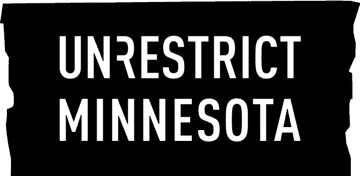As a community-supported public awareness campaign, UnRestrict Minnesota is driven by the solidarity and leadership of its community partners. Together, these advocates, health care providers, lawyers, union members, artists, and concerned citizens are advancing every Minnesotan’s right to access abortion care in our state.
The National Council of Jewish Women Minnesota (NCJW) is a grassroots organization of volunteers and advocates who turn progressive ideals into action. As the Minnesota section of NCJW, NCJW Minnesota affects change through an extensive network of partnerships with other community organizations fighting for similar causes. Inspired by Jewish values, NCJW Minnesota promotes equity through service, justice through advocacy, and empowers their network as progressive change agents.
Q&A
Below, NCJW Minnesota’s executive director Erica Solomon talks about the close ties between the organization’s role as a member of the UnRestrict Minnesota coalition and NCJW’s values, history, and work.
Could you tell us a little bit about your work?
We are the Minnesota section of National Council of Jewish Women Inc., which is a nationwide network of organizations—we’re all our own individual nonprofits—who do different work, but coalesce around a number of priority issues. We like to say that our work is like a three-legged stool. The first leg is volunteerism, which was one of the grounding pillars of the organization from its founding in 1893. Obviously, across the years, what that direct service has looked like has really differed: we’ve been involved with movements in early childhood education, access to birth control, voter engagement efforts, and other projects where we have people on the ground doing the work.
Alongside that direct service piece, we’re dedicated to making long-term and systemic change. That’s where the second leg of our work comes in, as advocacy work. We have an advocacy committee that determines which issue areas we’ll work on. Reproductive health, rights, and justice has—and likely always will be—one of those primary issues. It’s just really fundamental to our history and the work that we do. Currently, that work has two sides. The first is working towards abortion access through our partnership with other organizations in the UnRestrict Minnesota coalition. The second is a project called Periods Happen, which is a menstrual equity initiative that involves both direct service—a product distribution program in schools and at other community, cultural, and mutual aid sites—as well as an advocacy and legislative component.
Last, the third leg of the stool is leadership development. Our programs, including the work that happens on the advocacy side, are volunteer-driven. It’s really important to us that we are able to offer educational, leadership, and growth opportunities so folks can feel empowered to mobilize and take the lead in their own communities. And in a lot of ways, this is also just a snapshot of the work that we do; like so many organizations, we’re always learning, we’re always evolving.
Why is this work important to take on in Minnesota?
One of the central values of Judaism is around preserving and protecting the health and life of the living. In the context of abortion access, we’ve seen that a lot of people hold the perception that all people of faith—or all groups that have a religion in their name—must be anti-abortion, and that perception comes from assuming a really specific, more fundamentalist, and more traditionally Christian lens. But actually, teachings on abortion in Judaism are very much in favor of abortion not only being permitted, but in some cases required, if the life of a pregnant person is at stake.
This is important in Minnesota because there really are not that many Jewish, faith-based organizations here who are doing social justice and advocacy work—though we’re very grateful for the partnership of the others that are out there. For me, what is so special about NCJW Minnesota is that it gives me the opportunity to live my Judaism and live my religious values in a space that isn’t traditionally just about religious observance. Especially in Minnesota, where there is a smaller population of Jewish voices than in some parts of the country, it’s really important for NCJW to provide people with a space to live a Jewish life through activism and advocacy. That advocacy is also deeply related to one of our core values: showing up for our neighbors; protecting their dignity and wellbeing; and advocating for respect, fairness, autonomy, and freedom of choice for all individuals.
Why did you join the UnRestrict Minnesota coalition?
Over time, as NCJW has worked in the reproductive space, we have done a lot of reflection about what it looks like for us to be advocates for abortion in Minnesota. As a coalition member, it has been invaluable to be partnered with organizations and individuals who are on the front lines of this work: people who are service and care providers, people who work in abortion funds, and others. We bring the lens of our faith to the table, but we also know that as a predominantly white, Jewish, and women-identifying organization, we represent just one facet of the vibrant variety of people in the world who might need an abortion.
What we really value about being a part of this coalition is that it gives us the opportunity to learn from other organizations; to provide resources and people power towards their work; and to educate our membership about what work is being done in this space. For example, after the Dobbs decision came down, we got so many messages from people whose first reaction was, “I want to offer to let people sleep on my couch,” or “I want to offer to give people a ride to a clinic.” And thanks to what we heard and learned from our coalition partners, we had the language to tell them: “Thank you, those are great intentions. There are folks who have been doing this work since well before this decision happened and who will continue for long after. Let us share with you what they’re saying they really need, because what they really need is money, advocacy, and people lifting up their mission.” So it’s been really important for us to be able to do that, and to lift up our coalition partners whenever we can.
What does achieving full reproductive justice in Minnesota mean to you?
I can really only answer that for myself, personally, but for me, what that means is that every individual—regardless of who they are and where they come from and how they identify—has full power and autonomy over their decision of when and whether to have children or to not have children. It means that young people are being educated about their reproductive health in medically accurate and evidence-based ways, and that they are empowered to make their own choices about their bodies and their health care. It means understanding that reproductive health isn’t just important for people when they reach a certain age and they leave a certain age. Being able to be in control of your life and your body is a lifelong journey.
What this looks like is having an established culture of support in our state: a state where people know where they need to go to receive reproductive health care and are able to access those places. A state where people know that their lawmakers will advocate for and protect their rights, and know that their faith communities and their workplaces and their families will support them. A state where you not only know that you have inherent rights that are protected, but you also know that your neighbors will stand up for your rights—and that you will stand up for theirs in turn.
How can people get engaged with your work?
Like many organizations, we are in a place of reflecting and evaluating what our work will look and how it will evolve in the world that we’re in. Right now, there are a few ways to tap in. If people want to be involved in our advocacy work, they can get involved with one of our advocacy issue committees. If they want to engage in more hands-on activities, there are opportunities to help to distribute period products in schools, or putting together abortion care kits. I think the biggest way to get engaged is just to keep in touch with us, because we are in this big place of transition and planning and growth. People can follow us on social media (Instagram, Twitter, Facebook); or if they are interested in getting more in the loop with our email list, they can always reach out to info@ncjwmn.org.


